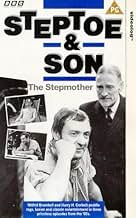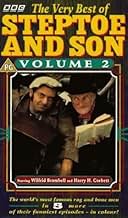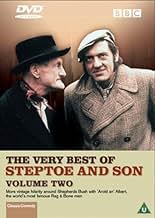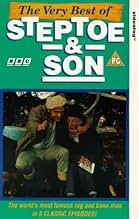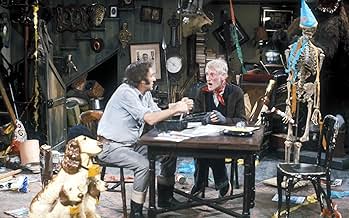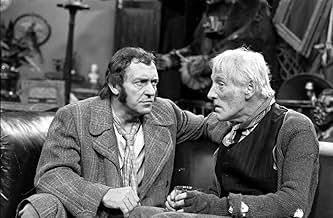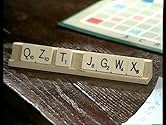NOTE IMDb
7,8/10
3,6 k
MA NOTE
Ajouter une intrigue dans votre langueBritish sitcom about a father-and-son rag-and-bone business in London. The intergenerational divide between the miserly Steptoe and his ambitious son results in comedy, drama, and tragedy.British sitcom about a father-and-son rag-and-bone business in London. The intergenerational divide between the miserly Steptoe and his ambitious son results in comedy, drama, and tragedy.British sitcom about a father-and-son rag-and-bone business in London. The intergenerational divide between the miserly Steptoe and his ambitious son results in comedy, drama, and tragedy.
- Récompenses
- 2 victoires au total
Parcourir les épisodes
Avis à la une
Although Steptoe and Son ran on British TV for twelve years it is one of those rare (maybe unique) examples of an idea which continued to develop and evolve rather than slide into stale repetition.
In its early years the series emphasised broad comedy. One well-remembered episode features Albert eating a meal while sitting in his bath, earning a rebuke from his son which became a national catchphrase: "You dirty old man!"
As time went by the characters became established and the writing began to emphasise the mutual dependency of two basically lonely men (Harold the batchelor and Albert the widower). Harold dreams of a better quality of life away from his father and constantly makes attempts to achieve something in his own right. His attempts are thwarted by his own lack of social standing and his father's scheming: if Harold joins a local theatre group, Albert joins too and becomes the star of the show.
Albert, for his part, fears losing his son and being abandoned in his old age. He will use any means (especially moral blackmail) to keep Harold at his side. More importantly he is far more realistic than Harold and sees that his attempts at social ambition are doomed.
In one of the most moving episodes an old girlfriend of Harold's reappears after many years. They still feel the same way about each other and plan to marry. Finally Harold can break away from the old man. Naturally Albert has other ideas, but at the climax of the show it is the girl who ends the relationship, telling Harold he is already married.
The performances of Wilfrid Brambell and Harry H Corbett never faltered through the show's run. Galton and Simpson produced scripts of wit and insight and they performed with great skill and subtlety. This is a show where you laugh while recognising the truth and basic sadness of the situation in which the characters live.
In its early years the series emphasised broad comedy. One well-remembered episode features Albert eating a meal while sitting in his bath, earning a rebuke from his son which became a national catchphrase: "You dirty old man!"
As time went by the characters became established and the writing began to emphasise the mutual dependency of two basically lonely men (Harold the batchelor and Albert the widower). Harold dreams of a better quality of life away from his father and constantly makes attempts to achieve something in his own right. His attempts are thwarted by his own lack of social standing and his father's scheming: if Harold joins a local theatre group, Albert joins too and becomes the star of the show.
Albert, for his part, fears losing his son and being abandoned in his old age. He will use any means (especially moral blackmail) to keep Harold at his side. More importantly he is far more realistic than Harold and sees that his attempts at social ambition are doomed.
In one of the most moving episodes an old girlfriend of Harold's reappears after many years. They still feel the same way about each other and plan to marry. Finally Harold can break away from the old man. Naturally Albert has other ideas, but at the climax of the show it is the girl who ends the relationship, telling Harold he is already married.
The performances of Wilfrid Brambell and Harry H Corbett never faltered through the show's run. Galton and Simpson produced scripts of wit and insight and they performed with great skill and subtlety. This is a show where you laugh while recognising the truth and basic sadness of the situation in which the characters live.
One of the saddest sights I ever saw on television was Wilfrid Brambell, close to tears on 'Nationwide' in 1982 following the sudden death of his 'Steptoe & Son' co-star Harry H.Corbett. The pairing of these great actors, combined with some wonderful scripts by Ray Galton and Alan Simpson, made 'Steptoe' a classic. I think viewers recognised the truthfulness of the situation; rag and bone man Harold desperately wanted to escape from his father's domination to begin a new life on his own, but couldn't because he loved the old man too much. When searching for comedy ideas, today's writers fall into the trap of thinking: "How can I shock the public?". 'Steptoe' did not set out to shock, yet did because it was so real. After a successful run in the '60's, it was revived in the '70's in colour, and these episodes are my favourites, particularly 'Divided We Stand' in which Harold and Albert tried to lead separate lives in the same house. The word 'timeless' is overused these days, but it definitely applies here.
I love this type of simple comedy. No complicated stories or phrases or lines. I'm a young'un myself, growing up in such a degraded and unfunny society, so it's nice that a show that's pushing 70 years old is perfectly capable to make me genuinely laugh. As I said before, this level of simple comedy keeps me coming back, and I'm often quoting the show around people who have no idea what I'm talking about. For it's time, Steptoe was the most vulgar, offensive show on the box, yet is now considered the "elder statesman" by some today. I find it's not repeated on TV enough, with Divided we Stand being repeated on BBC Four only last October. Yet BBC Three is ok with repeating Bad Education's Christmas Special three times in one night. In conclusion, Steptoe was ahead of its time, portraying a very grim and off-beat picture of working class life.
Steptoe and Son is probably the best British comedy ever. Featuring late stars, Wilfred Brambell and Harry H Corbett, this was an excellent show which never failed to amuse me and was true to life.
The show featured pensioner Albert Steptoe and his son Harold Steptoe (a pair of rag and bone men). They bickered, the fought, they sulked and generally got on each other's nerves. But underneath, there was a mutual love.
This show kind of reminded me of my own life. Even though I love my own dad, I did spend quite a few years of my life arguing with him even when I left home at 18. We were two different people with different outlooks on life and this led to some battles at times. This show was the same. Albert and Harold could not have been more different. Harold was fed up with his dad's filthy habits and moaning; Albert was always playing on Harold's emotions with phrases such as, "I'm an old man Harold. Need looking after." Also funny was the fact that Albert always ruined any prospective relationship that Harold was going to engage in. But they loved each other deep down and that was the fun of it.
Truly the greatest British comedy ever.
The show featured pensioner Albert Steptoe and his son Harold Steptoe (a pair of rag and bone men). They bickered, the fought, they sulked and generally got on each other's nerves. But underneath, there was a mutual love.
This show kind of reminded me of my own life. Even though I love my own dad, I did spend quite a few years of my life arguing with him even when I left home at 18. We were two different people with different outlooks on life and this led to some battles at times. This show was the same. Albert and Harold could not have been more different. Harold was fed up with his dad's filthy habits and moaning; Albert was always playing on Harold's emotions with phrases such as, "I'm an old man Harold. Need looking after." Also funny was the fact that Albert always ruined any prospective relationship that Harold was going to engage in. But they loved each other deep down and that was the fun of it.
Truly the greatest British comedy ever.
This is a BBC sitcom that's set in Shepherd's Bush, West London. It's about a father and son who are rag-and-bone men. It ran from 1962-1974. There were also films, plays, documentaries and versions of the TV series made by other countries.
It's well-written and well-acted. There are many good performances from actors who only appear in one or two episodes each.
It's well-written and well-acted. There are many good performances from actors who only appear in one or two episodes each.
Le saviez-vous
- AnecdotesWilfrid Brambell was only 49 when he began playing Albert Steptoe, who was supposed to be 63 when the series began.
- GaffesThe physical positioning of the Steptoe's outside toilet varies over the course of the series: sometimes it is plumbed in facing the yard gates, at other times it's rotated to face the wall.
- Citations
[repeated line]
Harold Steptoe: You dirty old man!
- ConnexionsAlternate-language version of Stiefbeen en zoon (1963)
Meilleurs choix
Connectez-vous pour évaluer et suivre la liste de favoris afin de recevoir des recommandations personnalisées
Détails
- Date de sortie
- Pays d’origine
- Langue
- Aussi connu sous le nom de
- Степто и сын
- Lieux de tournage
- Stable Way, Kensington, Londres, Angleterre, Royaume-Uni(Junkyard exteriors)
- Société de production
- Voir plus de crédits d'entreprise sur IMDbPro
- Durée45 minutes
- Couleur
- Mixage
- Rapport de forme
- 1.33 : 1
Contribuer à cette page
Suggérer une modification ou ajouter du contenu manquant

Lacune principale
By what name was Steptoe and Son (1962) officially released in India in English?
Répondre
